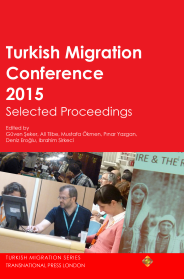The Fundamental Parameters of Turkey’s New Migration Policy and Management Within the Terms of New Legislation
The Fundamental Parameters of Turkey’s New Migration Policy and Management Within the Terms of New Legislation
Author(s): Ali Zafer Sağıroğlu
Subject(s): Politics, Geography, Regional studies, Public Law, Policy, planning, forecast and speculation, Transformation Period (1990 - 2010), Present Times (2010 - today), Migration Studies, EU-Legislation
Published by: Transnational Press London
Keywords: Turkey; migration; policy; legislation; law;
Summary/Abstract: Turkey has developed into the sending, transiting and receiving position in regard of migration throughout the republic’s history. These characteristics have differed from time to time depending on the global migration trends. In the early period of the republic, ethnic concerns became the main influence of the policies. Like the other contemporary nation states, Turkey used migration as an instrument of “homogenization” and building the nation-state (Kirişçi, 2007; Erder, 2007, p:6). İskan Kanunu (settlement law), issued in 1934, is important to show a typical policy of the early period. Turkey maintained the iskân kanunu and was in force until recently. The iskan kanunu deteremined that only the Turks or people of Turkic origins including the Muslims coming from the ex-territories of the Ottoman Empire were accepted as an “immigrant” (İçduygu, 2007, p: 206).
Book: Turkish Migration Conference 2015 Selected Proceedings
- Page Range: 39-44
- Page Count: 6
- Publication Year: 2015
- Language: English
- Content File-PDF

